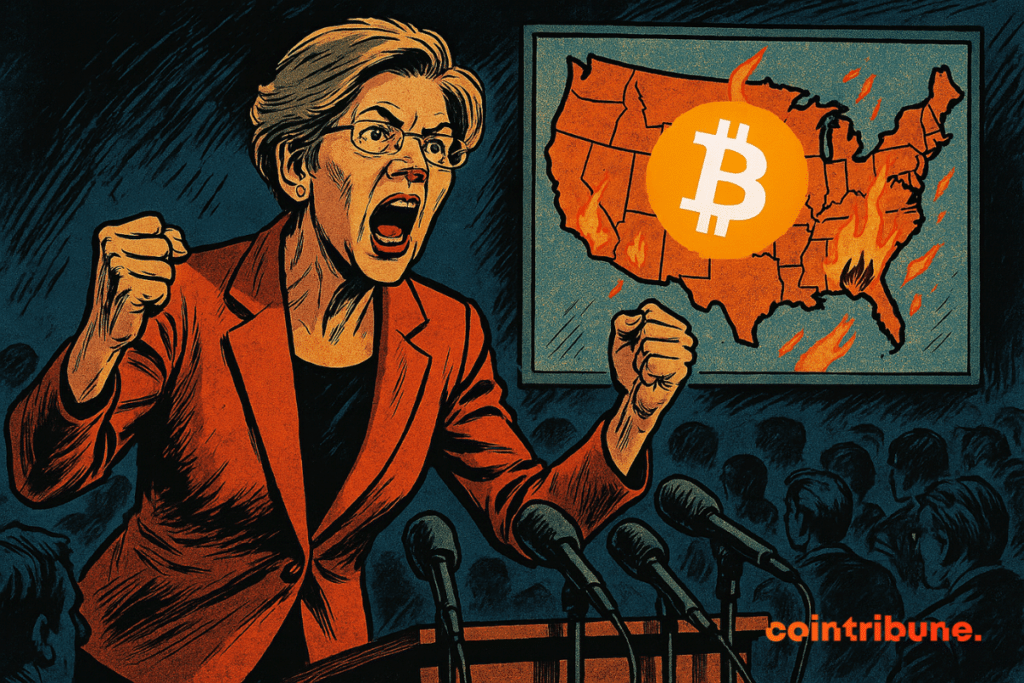Crypto: Elizabeth Warren Harshly Criticizes The GENIUS Act
The GENIUS Act, this regulatory framework meant to give new life to stablecoins, is welcomed as a strategic victory by Republicans and Donald Trump. For them, it combines innovation, digital sovereignty, and the power of the dollar. A crypto victory, in their eyes. But can it be trusted? A dissenting and sharp voice stands out: that of Elizabeth Warren. The Democratic senator alerts, denounces, and never moves forward without ammunition. Behind her criticisms, it is a system she accuses.

In brief
- Warren compares the GENIUS Act to the law that preceded the 2008 financial crisis.
- She accuses Trump of personal enrichment through crypto regulation favorable to his economic interests.
- Experts fear bank runs if private stablecoins escape any real control.
- The GENIUS Act could wrongly legitimize currencies without clear institutional safeguards.
The return of a déjà vu scenario, crypto version
Elizabeth Warren waves a specter: that of a repeated financial disaster. By mentioning the Commodity Futures Modernization Act of 2000, she revives the memory of a lax regulation that paved the way to the 2008 crisis. In her view, the GENIUS Act follows an identical pattern, this time in the crypto universe.
We have already seen this movie when the industry writes its own laws.
In 2000, she recalls, the derivatives industry submitted a weak text to Congress that gave the illusion of regulation. Result: a bubble that bursts eight years later. Today, it is the crypto sector playing the same role by offering a tailor-made legal framework.
In 2000, the derivatives industry handed lawmakers a bill that weakly regulated the sector while giving the illusion of government support.
For Warren, the stability promised by the GENIUS Act could hide dangerous permissiveness. Stablecoins, backed by the dollar but issued by private firms, could well become the new subprimes.
An economy shaped to enrich the powerful
Elizabeth Warren does not just criticize a law: she reveals a system. She accuses Trump of instrumentalizing crypto regulation for his personal profit, controlling both the currency and its arbitrators. “Trump uses the presidency to enrich himself through cryptos, and he does so in full view of everyone“, she insists.
She denounces a presidency where private interest prevails over the common good. The dissolution of the crypto unit at the Department of Justice, pressure on the SEC, and the appointment of allies from the industry form, according to her, a dangerous cocktail.
Donald Trump is the first president in American history to enact a law placing him at the head of regulators responsible for determining the value of a large part of his own fortune.
The American economy, in this configuration, becomes a tool for enrichment without safeguards. Warren says it clearly: this law does not protect citizens; it institutionalizes a conflict of interest.
Behind regulation: a new power without control
Beyond the promises of stability, the GENIUS Act opens the door to a new form of finance, where stablecoins become quasi-banks. Sergi Basco, professor of economics, warns: “It is not certain that issuers of private stablecoins are sufficiently regulated to avoid potential bank panics“.
The panic around Silicon Valley Bank in 2023 is a sad reminder. There too, assets deemed safe were not enough to avoid the client run. Trust, the key to any economy, falters faster than people think.
Warren adds that these stablecoins could mislead: “The public could mistakenly believe the government backs these currencies“.
Key points to remember:
- 98% of stablecoins are backed by the dollar, but the majority of transactions take place outside the United States;
- Stablecoins give the illusion of state stability while escaping traditional banking rules;
- Trump launched his own cryptos while imposing a law favorable to their expansion;
- The illusion of security could trigger a global crisis if trust disappears.
Warren calls for vigilance: what is presented as innovation could become a lever for very real instability.
The GENIUS Act embodies an ambition: to relaunch the digital dollar and give the United States a competitive advantage again. But behind this goal lies a complex, unstable, and potentially dangerous architecture. According to Amundi, this project could even weaken the global financial system if flows massively shift to private stablecoins. In trying to save the dollar, the United States risks destabilizing the very economy it still dominated.
Maximize your Cointribune experience with our "Read to Earn" program! For every article you read, earn points and access exclusive rewards. Sign up now and start earning benefits.
La révolution blockchain et crypto est en marche ! Et le jour où les impacts se feront ressentir sur l’économie la plus vulnérable de ce Monde, contre toute espérance, je dirai que j’y étais pour quelque chose
The views, thoughts, and opinions expressed in this article belong solely to the author, and should not be taken as investment advice. Do your own research before taking any investment decisions.